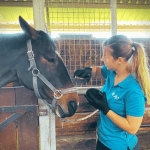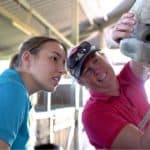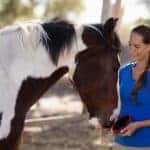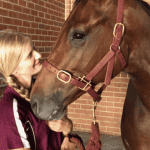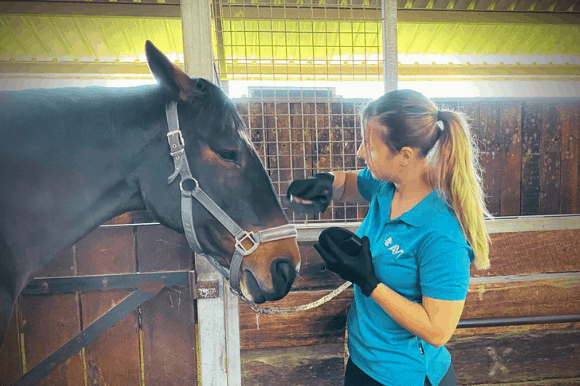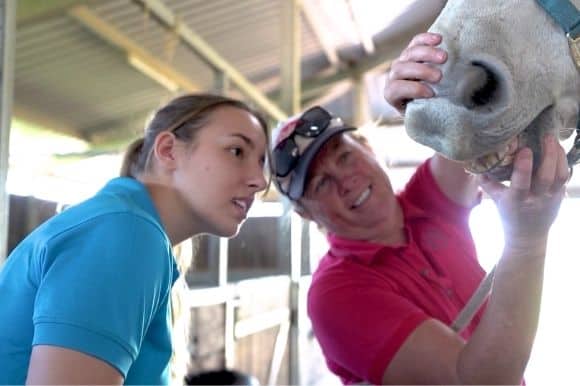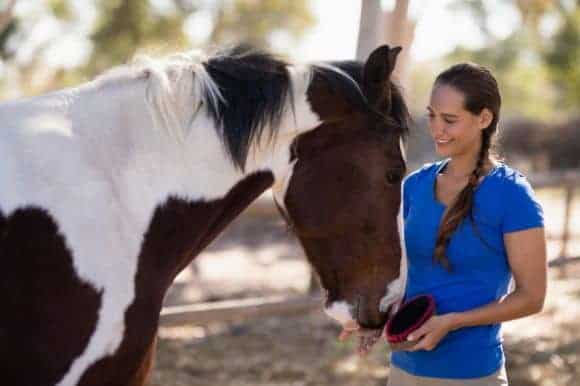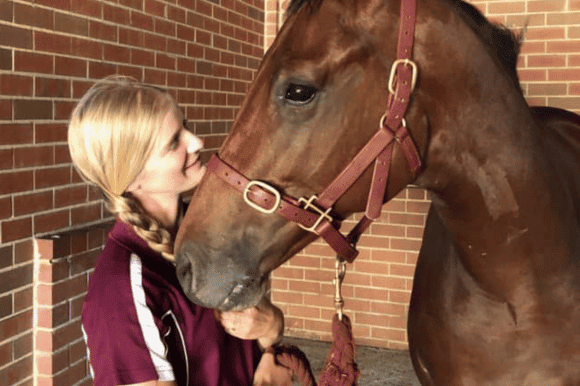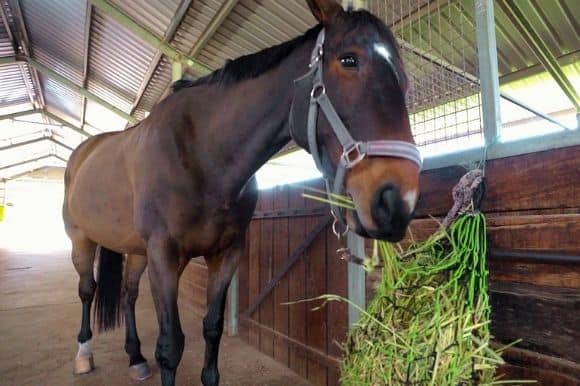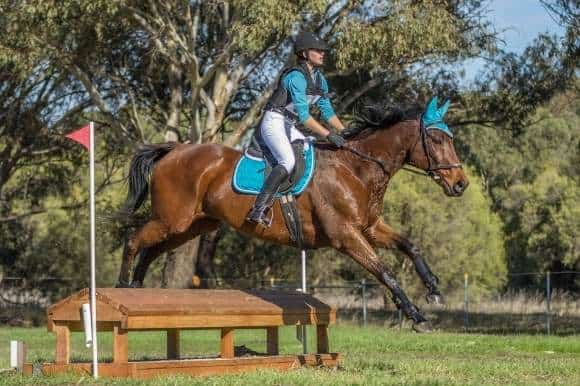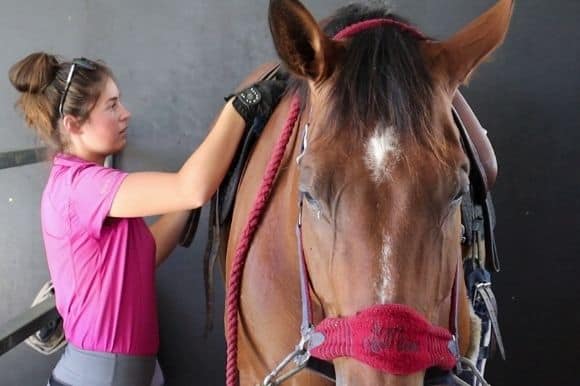Essential reading for teen riders and horse-lovers
If you’re 15 or 16 and dreaming of working with horses (maybe in a stable, on a stud farm, or at a riding school) this post is for you. And if you’re a parent wondering whether this is a good, safe pathway for your child, keep reading. The horse world can be rewarding, but it’s also tough, unpredictable, and not always as structured or ethical as you might hope.
To get a real-world perspective, we spoke to Ann-Marie Moyles, a qualified vet nurse, AVT educator and head equine nurse with years of experience in both Australia and overseas. What followed was an honest, open conversation about how young people can get started, what to expect, and how to spot the red flags.
This isn’t the sugar-coated version, it’s candid advice you’d give to a friend’s daughter who says, “I love horses and I want to work with them.”
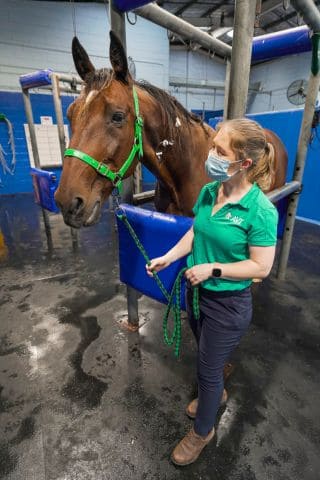
Start with the basics: Do your research
“I’d be saying, get yourself a good horse husbandry book,” Ann-Marie said. “Have a read of that so you’ve got some understanding before getting hands-on.”
And more importantly, start narrowing your focus.
“There are so many different parts of the horse industry: racing, eventing, dressage, stud farms, riding schools, therapy programs. Try and work out what it is that really interests you. What part of it lights you up?”
If you’re not into books, consider doing a short course or a foundation-level program to get the basics. The point is to start learning, even the lingo.
“Even just knowing the right terms helps. People will take you more seriously if you’ve made the effort to understand the basics.”
Getting experience (without getting taken for a ride)
Once you’ve got some background knowledge, the next step is real-world experience.
“So many riding schools or livery or boarding stables will take on helpers during school holidays,” Ann-Marie explained. “But don’t expect to be handed the reins on day one”. You’ll need some experience with horses before being considered. Even basic riding lessons can make a big difference in building your confidence and showing you’re serious.
Here’s what she recommends:
- Take riding lessons if you haven’t already. “Have you even ridden a horse? Do you feel comfortable around them? Start there.”
- Build a relationship with your local riding school. They might take on helpers or volunteers during holidays.
- Join your local pony club not just for riding, but because they’ll teach you husbandry, feeding, stable management and more.
- Ask people in the industry what Facebook groups to join. “These days there are loads of horse community groups online, but your local stables or pony clubs will usually know the ones worth looking at.”
Ann-Marie pointed out that pony clubs can often direct young people to trusted workplaces, or at least give them a steer in the right direction. And that word-of-mouth factor is huge, especially in a small, tightly connected industry.
What you’ll actually be doing
(hint: not riding… yet)
“You might be thinking you’re going to be riding out every day or leading horses, but in reality, you’ll probably start with feeding up, mucking out, cleaning paddocks, cleaning gear, that kind of thing.”
In fact, at the beginning, you might not even be near a horse.
“You might be prepping the feeds, not actually feeding the horses. You might be painting fences, doing runs to the feed store, cleaning the troughs. That kind of stuff could go on for weeks, until they know you, and they trust you.”
And that’s not a bad thing. “My mum always used to say, in a hair salon, you start by sweeping the floor. Same in a stable.”
A word on safety and expectations
This is one part Ann-Marie doesn’t sugar-coat.
“Horses are flight animals and they can be dangerous. People are less inclined to hire someone with little experience, and rightly so,” she said. “They’re not going to be getting you to handle their difficult horses straight away.”
So no, you’re probably not going to be grooming, tacking up or leading horses on your first day. But that’s a good sign, it means they’re taking safety seriously.
You’ll need to show that you’re comfortable and competent doing the small things first. And from there, you’ll slowly earn more responsibility.
How to tell if a workplace is suitable
“Word of mouth is everything,” Ann-Marie said. “People in the horse world know who’s good and who to avoid.”
So if someone recommends a stable, stud or trainer and they’ve been around the traps, that’s usually a good sign.
Still, when you visit, there are things to look for:
- Is the place tidy? You should be able to eat your dinner off the stable floor, Ann-Marie suggests. “There shouldn’t be rugs or gear thrown everywhere, or broken equipment lying around.”
- Do they have structure? Feeding, mucking out, turnout, it should all run like clockwork.
- Do they take the time to explain things to you? If they’re happy to guide you, even with small jobs, that says a lot.
And don’t be afraid to ask. “Ask what an average day looks like. What sort of jobs would I be doing? That’ll tell you a lot.”
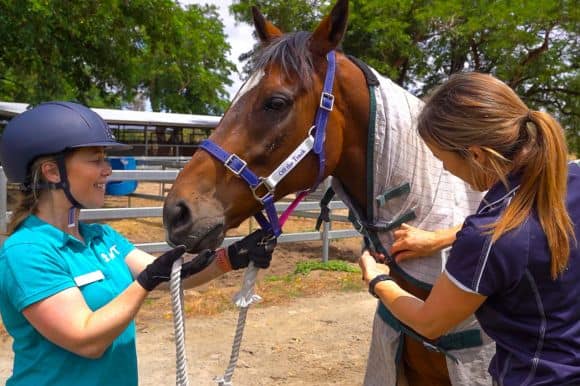
Pony club: Still one of the best starting points
“Pony Club is brilliant,” Ann-Marie said. “You can do everything from handling to feeding. They go through it all.” The exams range from beginner (D level) right up to instructor level, and it’s a great place to meet people in the industry.
“And if you’re a bit older, there are adult riding clubs too. They don’t usually have exams, but they do events and learning days. It’s another good entry point.”
It’s not all horses, all of the time
Ann-Marie shared a story that captures this perfectly.
“I once went to do vet nurse placement at a clinic and they sent me out to their property to paint fences. Another time I got sent out to buy tights for the boss’s daughter! And I still had to get back and balance the till.”
The point? You do what needs to be done. That’s how small businesses, especially family-run ones, work. And if you show you’re willing to pitch in, people remember that.
Final thoughts: Be open, stay humble, keep learning
Working with horses is a lifestyle. It’s not a 9-to-5 job. It’s early mornings, late finishes, dirty boots, and slow trust-building. But if you love it, it can be one of the most rewarding industries to be part of.
“Just don’t expect to be in charge on day one,” Ann-Marie said. “And don’t assume watching YouTube videos is a substitute for real experience. It’s not.”
And to the parents: if your child is serious, help them take the right steps. A short course. Riding lessons. A good book. Pony Club. These small steps show commitment, and that matters.

Meet our expert contributor: Ann-Marie Moyles
Veterinary Nurse and Trainer & Assessor
Ann-Marie graduated with a Diploma in Veterinary Nursing from University College Dublin in 2009. She began her career in a busy mixed practice in Ireland before heading to Australia, where she worked as an equine nurse at Murdoch University and in a private equine practice south of Perth. In 2015, she returned to Murdoch as Head Equine Nurse, a role she held until 2020.
Ann-Marie has a deep passion for both equine medicine and emergency nursing, and more recently has rediscovered her love of small animal care while working at Challenger Vet Hospital in Perth. A passionate educator, she holds a Graduate Certificate in Tertiary and Adult Education (Murdoch University, 2019) and is also an RCVS-trained examiner. She has presented at both the Bain Fallon and VNCA conferences and continues to guide the next generation of veterinary nurses and animal care professionals.
Qualifications: Dip VN RVN
Courses you may like
Introduction to Horse Care
Horse Care Fundamentals
About Horse Care Fundamentals
Online Short Course
For Vet Nurses
Equine Veterinary Nursing
About Equine Vet Nursing
